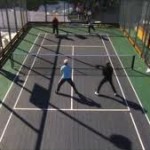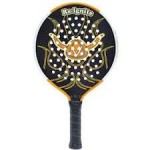I played a lot of tennis growing up, in part because we had a tennis court in our back yard, but mostly because my mother was an avid player. This was back in the sixties, in the days when women’s sports, competition and sweat were considered unseemly. I certainly didn’t have scads of lessons and my friends and I were mostly self taught through many pick-up games. Susan Coleman and I were pretty decent players, but early on I also recognized the difference between being athletic and being an athlete. Athletic describes God-given hand-eye coordination, speed, and/or anticipation, while the word athlete describes additional training, conditioning and competitiveness. That type of commitment just wasn’t in me; the thought of simply working out was repulsive and I rarely cared if I won or lost, though I do think that Susan and I had some sort of vague rivalry.
I remember watching a very young Chris Evert playing at the US open and my mother turned to me and said, “Aren’t you glad that I never pushed you to be so good?” She gave the example of a local woman in her 20s, who had taken many lessons and was shuttled around to tournaments as a teenager, but was never good enough to play professionally. I remember seeing her around the tennis courts, but mostly remember her odd tan lines that spoke of long hours in the sun hitting balls. I have a vivid memory of noticing her bare feet as she changed her socks. She had a dark, dark tan that abruptly stopped at her ankles showcasing deathly pale white feet; this was at a time when a perfectly even tan provided some social cachet. My God, I thought, this poor girl never takes off her tennis shoes. My mother said, “If I pushed you might improve, but then there would be nobody around here to play with you. You’d be bored playing with the rest of us – it just wouldn’t be any fun. The only thing she can do is hit with the pro. It’s pathetic.” My mother was looking at tennis as a life long sport, but at the same time seemed to be touting mediocrity as a useful life skill. But I saw her point.
the example of a local woman in her 20s, who had taken many lessons and was shuttled around to tournaments as a teenager, but was never good enough to play professionally. I remember seeing her around the tennis courts, but mostly remember her odd tan lines that spoke of long hours in the sun hitting balls. I have a vivid memory of noticing her bare feet as she changed her socks. She had a dark, dark tan that abruptly stopped at her ankles showcasing deathly pale white feet; this was at a time when a perfectly even tan provided some social cachet. My God, I thought, this poor girl never takes off her tennis shoes. My mother said, “If I pushed you might improve, but then there would be nobody around here to play with you. You’d be bored playing with the rest of us – it just wouldn’t be any fun. The only thing she can do is hit with the pro. It’s pathetic.” My mother was looking at tennis as a life long sport, but at the same time seemed to be touting mediocrity as a useful life skill. But I saw her point.
My so called tennis “career” sputtered along; I played on a club team in college where I had a very nice forehand but not much else, and after college played socially on the weekends. But then in my early 20s a new racquet sport arrived in town – an odd hybrid called paddle tennis. This is played outdoors in the winter on a miniature version of a metal tennis court surrounded with chicken
called paddle tennis. This is played outdoors in the winter on a miniature version of a metal tennis court surrounded with chicken  wire. The paddles look like jumbo perforated ping pong paddles. You play with a solid foam ball and score like tennis, with the additional feature that you can retrieve balls off the surrounding wires. The early years of paddle tennis presented an extremely small pond and suddenly there was a chance for someone with decent racquet skills (like me) to play at the highest levels of the sport. Aha – an opportunity to be a competitive athlete without the annoying commitment to conditioning and training.
wire. The paddles look like jumbo perforated ping pong paddles. You play with a solid foam ball and score like tennis, with the additional feature that you can retrieve balls off the surrounding wires. The early years of paddle tennis presented an extremely small pond and suddenly there was a chance for someone with decent racquet skills (like me) to play at the highest levels of the sport. Aha – an opportunity to be a competitive athlete without the annoying commitment to conditioning and training.
This worked for a while; I played in the Series I league and competed in regional tournaments. And then all of a sudden, the sport started to attract legitimate tennis professionals, who like me 15 years earlier, were looking for a smaller pond. These were accomplished tennis players who had early dreams of joining the tennis tour, but now in their late 20s realistically moved down a few notches to become tennis club professionals. The sport also started to attract recently graduated Division I tennis players, and within a few short years, I was completely out of my league. I drifted down from the elite Series I league, into the lesser Series, II, III and IV. Occasionally I would cross paths with some young hot tennis pro who had just picked up the sport a couple of weeks ago and was now blazing her way into the upper echelons. In one league match I was partnered with Terry, a tennis player who had actually played at Wimbledon, and might have even dated Boris Becker. I was doing my usual thing on the court, chatting with our opponents, saying nice shot, perhaps laughing when I made one of my routine stupid mistakes. Suddenly my very intense partner looked at me and said, “Will you please shut up!” And then I know my mother was right. Terry’s competitive nature had been honed to a knife-sharp edge with careful life-long nurturing. She was all business on the tennis court, and was probably trained to hate her opponent, at least that is what Martina said gave her the winning edge over Chris Evert. A couple of months later, Terry had zoomed up to Series I, and I decided to be happy where I was.
Well sort of. A couple of weeks ago I was out flailing away on the courts, and I noticed that one of the women I had successfully played with a couple of years ago was now the fourth in a match featuring three other tip top players. I always thought I was about equal in talent with her, and here she was mixing up with the big girls. What had happened? She had awkward strokes and clearly wasn’t as accomplished as the other players, whose professionalism was immediately apparent as they lightly bounced before each service return, and gave each other hand signals at the net. I suffered a fleeting pang of jealousy and then suddenly realized, “Oh she’s just their deuce bitch.” Even so I was still jealous.
Ah, the deuce bitch, the fill-in fourth of lesser talent who is asked to cover a scrap of the court and just set up her partner. Now lest you think my jealousy indicates that my athletic identity has fallen into the dumper, I would like to point out that deuce bitch is an endearing term, far from the humiliating damage control position that is inherent in mixed sports, and far from a brown-nosing suck up who is playing beyond her ability. Defensive play has a major role in paddle tennis, and a player who can successfully lob and set up their offensive-minded partner can be a real asset. This is unlike tennis where the larger court expanse simply cannot absorb a weaker partner. In a paddle tennis league having a few good deuce bitches on the roster is absolutely essential. I decided this would be my aspirational goal – if I could improve my focus and first volley, stay steady and avoid succumbing to visions of grandeur with harebrained heroics, I might qualify as a deuce bitch. That’s all I really want, I am at peace with my mediocrity, but an occasional whiff of the inner sanctum of the elite would be heavenly.
I envision the following point counterpoint between myself and Rae Lynn, a prototype of the newly minted paddle pro.
Liza:
I love paddle and I have been working on my game for years, but let’s face it, with all these young tennis pros picking up a paddle, I’m always going to be a journeyman, and I’m okay with that, really I am. This year the Series I team had a few drop outs and I thought that I might move up, but then our pro went out and recruited one of her college buddies, so no luck, I’m staying put.
Rae Lynn:
Let’s face it, I was never going to make it on the pro tennis tour. So teaching tennis at this country club is a good gig, but I wasn’t so sure about the winter. I hate playing indoor tennis and then they told me that I could be a paddle pro. What’s a paddle, I said? Couple months later and I’m playing at the top level. I’ll be able to compete in the Nationals and get a national ranking next year. Not bad – I could never have this success in tennis.
Liza:
But maybe Series I will need a sub from time to time and I can be a deuce bitch. I would like that.
Rae Lynn:
Next match is an away match – and it’s at least a 45 minute drive. My regular partner has already bailed and I was going to follow suit, but she told me that since I was new to the team, I had to suck it up and make the drive. But then she told me that the captain would get me a good deuce bitch to play with. What’s a deuce bitch?
Liza:
I just got a call from our team captain and she told me that our team is a little thin today, and would I mind playing with Rae Lynn on Court 1. I was supposed to be at a parent-teacher conference, but this might be my big chance, so I’m going to blow it off.
Rae Lynn:
My captain told me that every paddle pro playing in a club league needs a good deuce bitch every now and then. She partnered me with Liza, and told me that she has been around long enough to know what makes a good deuce bitch.
Liza:
Maybe if I do my job well and show that I’m worthy, I’ll even get invited to some weekend games with the big girls. There’s Rae Lynn over there talking with some of the other pros. I hope that she isn’t too pissed that she has to play with me, but I want her to understand that I know my role. “Hello Rae, I’m Liza, and I just want to let you know that it would be my privilege to be your deuce bitch.”
The missing words in the following poem are anagrams (i.e. share the same letters like spot, post, stop) and the number of asterisks indicates the number of letters. Your job is to solve the missing words based on the above rules and the context of the poem. Scroll down for answers.
I’m willing to do almost anything to maintain my ******** seat
Among the tip top players of the paddle tennis elite.
But true athletes joining the game is what has been transpiring
So it might be too late to achieve what I’ve been ********.
I’m now ******** in the lower leagues and the only way I can make a switch
Is to work hard and hope that I become someone’s deuce bitch.
*
*
*
*
*
*
ringside, desiring, residing
Follow Liza Blue on:Share:
